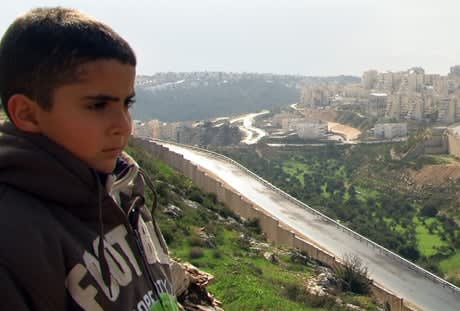Because of the plethora of news footage documenting the war between Palestine and Israel available to the North American public, there's a resultant desensitization to the harsh reality that strangely seems commonplace. We see people fight and die on the news, but ultimately shrug it off since it's on the other side of the Earth and far less appealing than the less problematic issues presented by TLC or MTV.
Directors Emad Burnat and Guy Davidi attempt to bring a dose of reality to the big screen with 5 Broken Cameras, providing a grim reminder of the acrimonious insolvability of the Israeli-Palestinian conflict, as well as a human perspective to a battle that the rest of the world can't begin to understand.
Emad Burnat, a Palestinian peasant in the small town of Bil'in, receives his first camera from a friend in 2005 when his youngest son is born. This coincided with when the Israeli Army began expropriating land for a Jewish settlement and building the West Bank barrier to divide the two zones. Burnat began documenting the struggle of his townspeople as they organized weekly non-violent demonstrations, recording the clashes that ensued, capturing the assaults, tear gas grenades and use of deadly force his people subsequently faced.
Beyond some of the more appalling scenes, Burnat cleverly catches not only the impact of the violence but also how it affects his town and, more importantly, his family. Through the course of the multi-year documentary, we see his youngest son grow from a baby to a young boy and, most startlingly, we witness this young boy grow to despise the Israeli Army.
It is interesting to note that while Emad Burnat is Palestinian, his co-director, Guy Davidi, is a Jewish-Israeli filmmaker, which may have helped bring a small amount of balance to the single perspective presented in this film. The gritty and occasionally clumsy camcorder footage adds to the realism of the documentary, with Burnat's voiceover narration underscoring the emotion.
Burnat goes through five different cameras as they are destroyed by the very hostilities he's documenting, and at one point one of his cameras even saves his life, taking a bullet that would have otherwise hit the side of his head. These cameras become a testament to a man as he struggles to survive amidst a fight that seemingly has no end in sight, yet perseveres for the good of his people and family.
(Kinosmith)Directors Emad Burnat and Guy Davidi attempt to bring a dose of reality to the big screen with 5 Broken Cameras, providing a grim reminder of the acrimonious insolvability of the Israeli-Palestinian conflict, as well as a human perspective to a battle that the rest of the world can't begin to understand.
Emad Burnat, a Palestinian peasant in the small town of Bil'in, receives his first camera from a friend in 2005 when his youngest son is born. This coincided with when the Israeli Army began expropriating land for a Jewish settlement and building the West Bank barrier to divide the two zones. Burnat began documenting the struggle of his townspeople as they organized weekly non-violent demonstrations, recording the clashes that ensued, capturing the assaults, tear gas grenades and use of deadly force his people subsequently faced.
Beyond some of the more appalling scenes, Burnat cleverly catches not only the impact of the violence but also how it affects his town and, more importantly, his family. Through the course of the multi-year documentary, we see his youngest son grow from a baby to a young boy and, most startlingly, we witness this young boy grow to despise the Israeli Army.
It is interesting to note that while Emad Burnat is Palestinian, his co-director, Guy Davidi, is a Jewish-Israeli filmmaker, which may have helped bring a small amount of balance to the single perspective presented in this film. The gritty and occasionally clumsy camcorder footage adds to the realism of the documentary, with Burnat's voiceover narration underscoring the emotion.
Burnat goes through five different cameras as they are destroyed by the very hostilities he's documenting, and at one point one of his cameras even saves his life, taking a bullet that would have otherwise hit the side of his head. These cameras become a testament to a man as he struggles to survive amidst a fight that seemingly has no end in sight, yet perseveres for the good of his people and family.
